Related Research Articles

Libya, officially the State of Libya, is a country in the Maghreb region of North Africa. It is bordered by the Mediterranean Sea to the north, Egypt to the east, Sudan to the southeast, Chad to the south, Niger to the southwest, Algeria to the west, and Tunisia to the northwest. Libya comprises three historical regions: Tripolitania, Fezzan, and Cyrenaica. With an area of almost 1.8 million km2 (700,000 sq mi), it is the fourth-largest country in Africa and the Arab world, and the 16th-largest in the world. The country's official religion is Islam, with 96.6% of the Libyan population being Sunni Muslims. The official language of Libya is Arabic, with vernacular Libyan Arabic being spoken most widely. The majority of Libya's population is Arab. The largest city and capital, Tripoli, is located in north-western Libya and contains over a million of Libya's seven million people.

Baghdadi Ali Mahmudi is a Libyan politician who was Secretary of the General People's Committee of Libya from 5 March 2006 to as late as 1 September 2011, when he acknowledged the collapse of the GPCO and the ascendance of the National Transitional Council as a result of the Libyan Civil War. He has a medical degree, specialising in obstetrics and gynecology, and had served as Deputy Prime Minister to Prime Minister Shukri Ghanem since 2003 at the time he was appointed to replace him. He was a part of Gaddafi's inner circle at least prior to his escape in mid-2011. He was arrested in Tunisia for illegal border entry and jailed for six months, although this was later overruled on appeal, however a Tunisian court decided to extradite Mahmoudi to Libya under a request from Libya's Transitional Council.
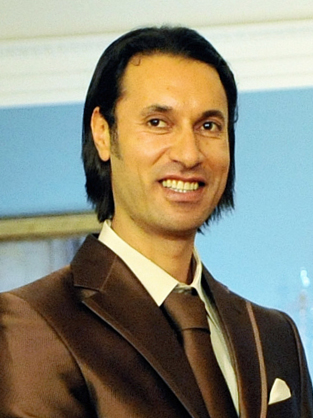
Mutassim Billah Gaddafi was a Libyan Army officer, and the National Security Advisor of Libya from 2008 until 2011. He was the fourth son of former Libyan leader Muammar Gaddafi, and a member of his father's inner circle. His mother was Safia Farkash, who was said to be a Hungarian from Bosnia & Herzegovina. He was captured during the Battle of Sirte by anti-Gaddafi forces, and killed along with his father.

The Libyan Civil War began on 17 February 2011 as a civil protest and later evolved into a widespread uprising. By mid-August, anti-Gaddafi forces effectively supported by a NATO-led international coalition were ascendant in Tripolitania, breaking out of the restive Nafusa Mountains in the south to mount an offensive toward the coast and advancing from Misrata on loyalist-held cities and villages from the north and east.

The National Transitional Council (NTC) was a transitional government established in the 2011 Libyan civil war. The rebel forces overthrew the Libyan Arab Jamahiriya of Muammar Gaddafi. The NTC governed Libya for a period of ten months after the end of the war, holding elections to a General National Congress on 7 July 2012, and handing power to the newly elected assembly on 8 August.

The National Liberation Army, officially the National Liberation Armed Forces of the Free Libyan Republic, formerly known as the Free Libyan Army, was a Libyan military organisation affiliated with the National Transitional Council, which was constituted during the First Libyan Civil War by defected military members and civilian volunteers, in order to engage in battle against both remaining members of the Libyan Armed Forces and paramilitia loyal to the rule of Muammar Gaddafi. It had prepared for some time in portions of Eastern Libya controlled by the anti-Gaddafi forces for eventual full-on combat in Western Libya against pro-Gaddafi militants, training many men before beginning to go on the offensive. They have battled for control of Benghazi, Misrata, Brega, Ajdabiya, Zawiya and Ra's Lanuf as well as several towns in the Nafusa Mountains. They finally began the Battle for Tripoli in August 2011 when they attacked from the west of the city, as well as fomenting an internal uprising on 20 August.

Moussa Ibrahim Gaddafi is a Libyan political figure who rose to international attention in 2011 as Muammar Gaddafi's Information Minister and official spokesman, serving in this role until the government was toppled in the Libyan Civil War. Ibrahim held frequent press conferences in the course of the war, denouncing rebel forces and the NATO-led military intervention, often in defiant and impassioned tones. His status and whereabouts remained unknown following the Battle of Tripoli in which the Gaddafi government was overthrown, although there were several claims and subsequent refutations of his capture. Eventually, in late 2014, it was discovered he was in Egypt before he was deported and fled to Serbia. On 12 January 2015 Moussa Ibrahim spoke publicly by video link at a political event hosted at the Committee Rooms Houses of Parliament, Westminster, London from an undisclosed location, also the Director of Private Security Company.
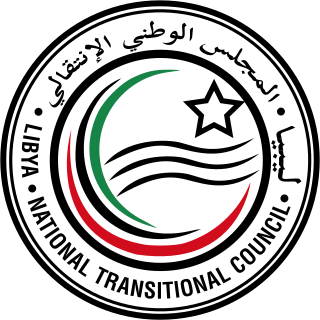
The aftermath of the 2011 Libyan civil war has been characterized by marked change in the social and political order of Libya after the overthrow and killing of Muammar Gaddafi in the civil war that was fought in Libya in 2011. The country has been subject to ongoing proliferation of weapons, Islamic insurgencies, sectarian violence, and lawlessness, with spillovers affecting neighboring countries including Mali.
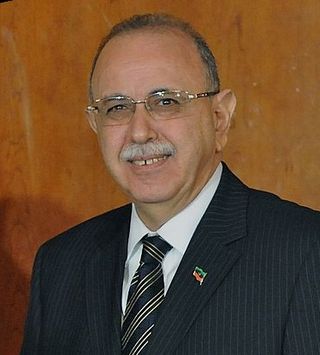
Abdurrahim Abdulhafiz El-Keib, PhD, was a Libyan politician, professor of electrical engineering, and entrepreneur who served as interim Prime Minister of Libya from 24 November 2011 to 14 November 2012. He was appointed to the position by the country's National Transitional Council on the understanding that he would be replaced when the General National Congress was elected and took power. Power was handed to the Congress on 8 August 2012, and the assembly appointed El-Keib's successor Ali Zeidan in October 2012.

Following the end of the First Libyan Civil War, which overthrew Muammar Gaddafi, there was violence involving various militias and the new state security forces. This violence has escalated into the Second Libyan Civil War (2014–2020).
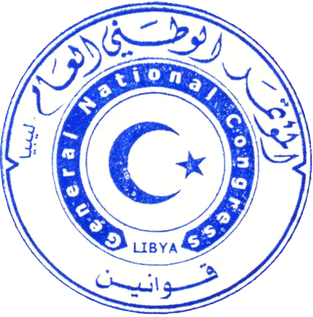
The General National Congress or General National Council was the legislative authority of Libya for two years following the end of the First Libyan Civil War. It was elected by popular vote on 7 July 2012, and took power from the National Transitional Council on 8 August.
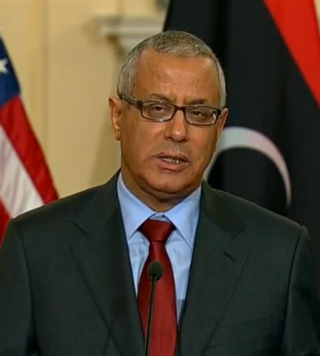
Ali Zeidan is a former Prime Minister of Libya. He was appointed by the General National Congress on 14 October 2012, and took office on 14 November after Congress approved his cabinet nominees. Prior to the Libyan Civil War, Zeidan was a Geneva-based human rights lawyer and according to the BBC, he is considered by some local observers as a strong-minded liberal. He was ousted by the parliament committee and fled from Libya on 14 March 2014. However, he told the press conference in Rabat, Morocco, that the ousting was invalid.

The cabinet was selected by Prime Minister Ali Zeidan on 30 October 2012 and was approved by the General National Congress on 31 October 2012 together with approving Zidan as Libya's first post-war Prime Minister. The cabinet is composed of the following ministers: Two women were selected to cabinet, and select ministries went to political independents who were not associated with any party.
Sadiq Abdulkarim Abdulrahman is a Libyan physician and politician who served as first deputy prime minister between 14 November 2012 and 29 August 2014.
Ashour Suleiman Shuwail is a retired Libyan security officer who served as the minister of interior in the cabinet that was formed after the first democratic elections in July 2012.
Salah Bashir Marghani is a Libyan jurist, and the former justice minister in the post-civil war government of Libya. He was part of Prime Minister Ali Zeidan's initial cabinet and took office on 14 November 2012.

Gaddafi loyalism, in a wider political and social sense also known as Green resistance, consists of sympathetic sentiment towards the overthrown government of Muammar Gaddafi, who was killed in October 2011, and his Third International Theory. Despite Muammar Gaddafi's death, his legacy and Jamahiriya ideology still maintain a popular appeal both within and without Libya into the present day. Regardless, the Western sentiment has largely been that this continued support may contribute to some of the ongoing violence in Libya.
The 2013 Libyan coup attempt was a coup d'état attempt by a group of members of the General National Congress to take control of the country from Libyan Prime Minister Ali Zeidan. Zeidan was kidnapped in the early hours of the 10 October by armed gunmen and was then released several hours later after a pro-government militia stormed the site where he was being held. Following his release Zeidan claimed the incident was an attempted coup orchestrated by two militias in line with members of the GNC opposed to Zeidan.

Abdullah al-Theni is a Libyan politician who became prime minister of the House of Representatives of Libya on 11 March 2014, when he took over in an interim capacity after the dismissal of Ali Zeidan. He was previously the defence minister in the government of Zeidan.
The following lists events that happened in 2014 in Libya.
References
- ↑ "Libyan oil minister Arousi resigns, latest blow to sector". Platts (McGraw Hill Financial) . 22 January 2014. Archived from the original on 19 May 2014. Retrieved 30 May 2022.
{{cite news}}: CS1 maint: unfit URL (link) - 1 2 3 4 5 "162nd Ordinary Meeting" (PDF). OPEC. Archived from the original (PDF) on 3 April 2013. Retrieved 17 February 2013.
- 1 2 3 4 5 6 7 Ibrahim El Mayet (5 November 2012). "Profile of Libya's New Oil & Gas Minister". Libya Business. Retrieved 17 February 2013.
- 1 2 3 4 Marie-Louise Gumuchian; Ali Shuaib (20 November 2012). "Abdelbari Al Arusi worked at Sirte Oil company". Reuters . Retrieved 27 February 2013.
- ↑ "Curriculum Vitae of Ali Zeidan's government ministers". Libya Herald . 3 November 2012. Retrieved 17 February 2013.
- ↑ "Libya's interim govt may seek new oil bids". Al Arabiya. 9 December 2012. Archived from the original on 1 March 2013. Retrieved 27 February 2013.
- ↑ Essam Mohamed (4 December 2012). "Libya announces new national oil company". Magharebia. Archived from the original on 11 April 2013. Retrieved 30 May 2022.
- ↑ "New oil and gas field found in Libya". Xinhua Daily . Tripoli. 15 February 2013. Archived from the original on 12 April 2013. Retrieved 30 May 2022.
- ↑ Ahmed Elumami; Feras Bosalum (20 August 2014). "Acting Libya oil minister to be replaced by NOC chairman". Al Arabiya. Reuters. Retrieved 2 September 2014.